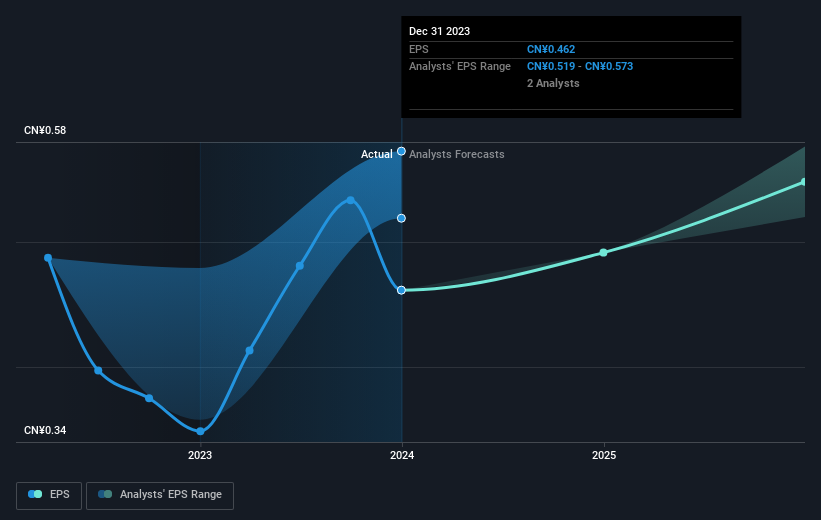Stock Analysis
Canny Elevator's (SZSE:002367) earnings have declined over three years, contributing to shareholders 17% loss

It can certainly be frustrating when a stock does not perform as hoped. But when the market is down, you're bound to have some losers. While the Canny Elevator Co., Ltd. (SZSE:002367) share price is down 26% in the last three years, the total return to shareholders (which includes dividends) was -17%. And that total return actually beats the market decline of 19%. But it's up 6.9% in the last week.
On a more encouraging note the company has added CN¥364m to its market cap in just the last 7 days, so let's see if we can determine what's driven the three-year loss for shareholders.
See our latest analysis for Canny Elevator
While markets are a powerful pricing mechanism, share prices reflect investor sentiment, not just underlying business performance. One flawed but reasonable way to assess how sentiment around a company has changed is to compare the earnings per share (EPS) with the share price.
During the three years that the share price fell, Canny Elevator's earnings per share (EPS) dropped by 9.3% each year. So do you think it's a coincidence that the share price has dropped 9% per year, a very similar rate to the EPS? We don't. So it seems that investor expectations of the company are staying pretty steady, despite the disappointment. It seems like the share price is reflecting the declining earnings per share.
The graphic below depicts how EPS has changed over time (unveil the exact values by clicking on the image).

We know that Canny Elevator has improved its bottom line lately, but is it going to grow revenue? You could check out this free report showing analyst revenue forecasts.
What About Dividends?
As well as measuring the share price return, investors should also consider the total shareholder return (TSR). The TSR is a return calculation that accounts for the value of cash dividends (assuming that any dividend received was reinvested) and the calculated value of any discounted capital raisings and spin-offs. It's fair to say that the TSR gives a more complete picture for stocks that pay a dividend. We note that for Canny Elevator the TSR over the last 3 years was -17%, which is better than the share price return mentioned above. This is largely a result of its dividend payments!
A Different Perspective
Although it hurts that Canny Elevator returned a loss of 9.7% in the last twelve months, the broader market was actually worse, returning a loss of 15%. Of course, the long term returns are far more important and the good news is that over five years, the stock has returned 0.2% for each year. It could be that the business is just facing some short term problems, but shareholders should keep a close eye on the fundamentals. I find it very interesting to look at share price over the long term as a proxy for business performance. But to truly gain insight, we need to consider other information, too. Consider risks, for instance. Every company has them, and we've spotted 1 warning sign for Canny Elevator you should know about.
If you like to buy stocks alongside management, then you might just love this free list of companies. (Hint: insiders have been buying them).
Please note, the market returns quoted in this article reflect the market weighted average returns of stocks that currently trade on Chinese exchanges.
Valuation is complex, but we're helping make it simple.
Find out whether Canny Elevator is potentially over or undervalued by checking out our comprehensive analysis, which includes fair value estimates, risks and warnings, dividends, insider transactions and financial health.
View the Free AnalysisHave feedback on this article? Concerned about the content? Get in touch with us directly. Alternatively, email editorial-team (at) simplywallst.com.
This article by Simply Wall St is general in nature. We provide commentary based on historical data and analyst forecasts only using an unbiased methodology and our articles are not intended to be financial advice. It does not constitute a recommendation to buy or sell any stock, and does not take account of your objectives, or your financial situation. We aim to bring you long-term focused analysis driven by fundamental data. Note that our analysis may not factor in the latest price-sensitive company announcements or qualitative material. Simply Wall St has no position in any stocks mentioned.
About SZSE:002367
Canny Elevator
Canny Elevator Co., Ltd. engages in the research and development, production, sale, installation, and maintenance of elevators in China.
Flawless balance sheet established dividend payer.

